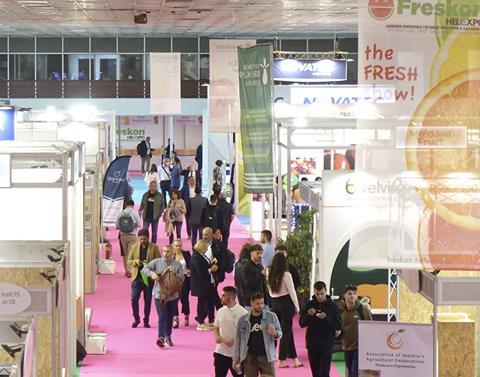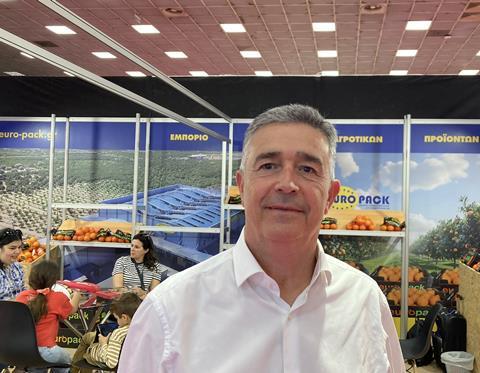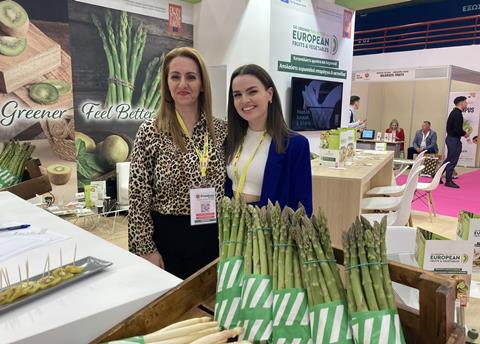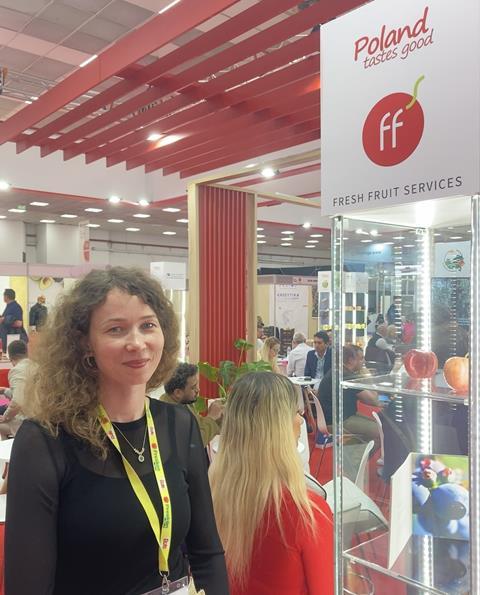Last month’s Freskon exhibition in Thessaloniki attracted more exhibitors and visitors from outside Greece than ever before, as competition heats up for multiple products on the European market
The Freskon International Trade Show for Fruit & Vegetables took place on 11-13 April in Thessaloniki, Greece, attracting record visitor numbers. Organisers announced a 58 per cent increase in visitors compared with last year, while the number of international visitors rose by 37.5 per cent.

“At this year’s Freskon, where Poland was the Country of Honour, with a participation of 15 companies, more than 2,600 business meetings were held, while there was also a hosted buyers programme, with 121 individuals from 34 countries and two group delegations of commercial visitors from Bulgaria and North Macedonia that raised the total number to 250,” organisers Tif-Helexpo stated.
Buyers from 14 supermarket chains from Greece, Bulgaria, Belarus, Ukraine, Cyprus, Poland, Romania, Serbia and North Macedonia held meetings at Freskon’s FreshConmarket 2024, organised by Tif-Helexpo and Froutonea magazine for the eighth year.
Scheduled side events included Freskon’s International Congress, focused on apricots and a forum on kiwifruit, as well as a new parallel exhibition organised by O.Mind Creatives, the Logistics & Transport Thessaloniki Expo.
In total, 267 direct and indirect exhibitors from 28 countries participated in the Freskon International Trade Show for Fruit & Vegetables.
As anticipated, the climate remained a major talking point during the show, with the Greek stonefruit campaign on the horizon during an unusually dry period for the north, and with much of the country still reeling from the record floods that hit central Greece last September following a summer of wildfires.
It is with relief, therefore, that Katerina Tsigara of Hellenic Land reports no weather issues thus far. “Last year was very difficult due to the weather conditions,” she recalls. “We had problems with strawberries and grapes, so we hope that everything will go better this year. A big issue has been the high winter temperatures, which can result in insufficient chilling hours.”
The company has at least enjoyed a positive period for lemons, according to Tsigara. “Exports from March until June are strong for the European market,” she says. “We have excellent growers, and our lemons are high-quality and a good size.”
When it comes to oranges, the climate remains a big challenge, according to Vasilis Gatzoyannis of Europack, while record summer temperatures are a worrying trend. “Climate change is impacting everyone,” he says. “It has affected volumes of oranges in Spain and Italy recently. It is a key factor.”

Europack is located in the south of Greece in the region of Sparta, with a large production of Valencia oranges. “The season lasts until October or November,” says Gatzoyannis. “We’re number one in Valencia oranges because of our facility at our location there. But we do exports all year round, so we also do winter oranges, Navels and Navel Lates, as well as mandarins and clementines.”
According to Gatzoyannis, there is big interest for Greek oranges from all over Europe, especially from eastern European markets like Romania, Serbia and Czech Republic. “They don’t have oranges there and they prefer Greek oranges to other origins,” he says. “The cost of transportation is also an important factor, and the further west you go, the greater the competition from Spanish oranges. There is also big competition from Egypt, where the cost of labour is much lower.”
The asparagus season in Greece comes to a close at the end of May, with harvesting coming earlier than other producing countries thanks to Greece’s warmer climate. Alfa Fruits boasts 50ha of asparagus production in the north of Greece and more in the west, where the company also has its kiwifruit production.

“We produce white, green and violet asparagus, which we sell all over Europe,” says executive assistant Georgia Adamou. “The product is too delicate to send too far away. We also have production of green, yellow and red kiwifruit varieties. We enjoyed a good kiwifruit season this year.”
International flavour
This year’s Freskon also welcomed multiple exhibitors from outside Greece, not just from Country of Honour Poland, but from Bulgaria, Moldova and even Burundi, the East African country where Jenika produces its avocados and green beans. According to CEO and founder Jessy Niyonkuru, green beans are mainly for the local market, while its Hass avocados are for export.
“We have our own farm with 500 Hass avocado trees,” she says, “and when the demand is high, we work with other producers. We are looking for better contracts to get better prices for our growers. Most of our produce goes to Europe and the UAE, but always via middlemen in Kenya and Tanzania, so we’re looking for direct partners. At the moment, of course, there are challenges in the Red Sea.”
Such challenges have also affected Moldovan exports to the Middle East, increasing the transport time and cost, and making the European market a more attractive option this year.
“Competition from the likes of Poland and Italy is intense for products like apples,” says Diana Vlasiuc, export market specialist at the Rural Competitiveness and Resilience Project in Moldova, financed by USAID. “But opportunities exist in stonefruit. We would like to expand our presence on the UK market. Last year we started with cherries and also grapes, so maybe we can promote these in the UK.”

The UK is the main market for Polish producer Fresh Fruit Services’ Gala apples and blueberries, which it has sold to some of the leading supermarkets for the past two decades. However, the company’s Marta Hermanowicz recognises the importance of finding customers all over.
“We have strong connections with the UK,” she says. “Before Poland joined the EU, our main market was Russia, and that involved the buyer coming to your farm, seeing your apples and paying in cash, so it was very easy! So all the specifications and audits were new to us at the time, and the UK was the best market. Standards were very high, but you always got the best price, and claims were always fair. This has started to change. Maybe Brexit is having an impact and prices are not as good as some other markets. We are looking for new markets for blueberries. Thankfully, there is good demand and potential for organic blueberries, including on the Greek market.”



